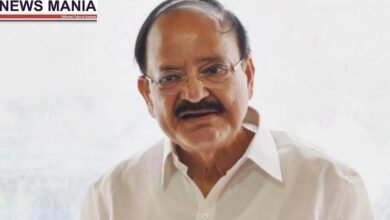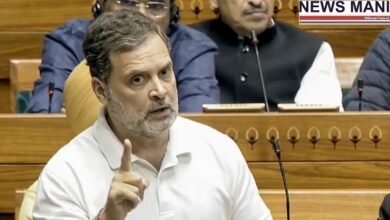Ex-Minister From Bengal Claims $1.25 Billion In GST Fraud And Cites Center’s Data
Former West Bengal Finance Minister and economist Amit Mitra foresaw a bleak future for the Goods and Services Tax (GST), claiming that the atmosphere in the GST council had turned toxic. At the West Bengal National University of Judicial Sciences (NUJS) in Kolkata, Mr. Mitra was giving a speech at a national conference on the success of the GST.
When describing how the GST council has changed over the past five years since the new tax system was implemented in 2017, Mr. Mitra stated, “There was a problem with taxes for 12 miles offshore. Eight states led by various political parties joined together, and I recall Nitin Patel—at the time, Gujarat’s deputy chief minister—coming to me and telling me, Dr. Mitra, you take the lead, and I’ll back you. He was a BJP. Then, all political parties in charge of the states bordering the sea shared an interest. These included the BJP, the Congress in Karnataka, Tamil Nadu, and Kerala, and the CPI(M) in Tamil Nadu. During a break, Mr. Jaitley and I sat down and said, Sir, we will not allow this to pass so that your Center can take over the entire taxation process. I still recall that moment. It’s intriguing that it was a collaborative, consensus-building environment.”
Mitra stated Then-Finance Minister Arun Jaitley concurred and claimed to have a sense of the house. “On his face, he commanded members of the central administration to retract this. The states will continue to control this. That feeling is gone. The council is currently majoritarian in nature. When I was there, it first began. actually toxic at times. And occasionally contentious. The most tragic aspect is that sometimes conclusions cannot be drawn,” he added.
According to Mr. Mitra, the GST Council, which is now the only organization in the nation that is entirely federalist, is comprised of ministers from 31 states and union territories and is presided over by the Finance Minister of India.
“There is no longer a place like it in the nation. The gradual deterioration of traditional federalism and consensus-building truly worries me. For the first three years, it was entirely consensus-based and cross-partisan “Mr. Mitra, a financial advisor to the West Bengal government, spoke before a group of law students, attorneys, and tax professionals.
Amit Mitra, who now serves as the Bengal Chief Minister’s principal chief advisor and has the status of a cabinet minister, drew attention to the fact that the GST council is failing to comply with the basic requirements set forth in the GST regulations. “GST Council meetings are required to take place as per Rule 6. They didn’t, however. I had to send a fairly direct letter that was made public as a result, and I was extremely appreciative when the union finance minister called a meeting a few days later. Why didn’t you convene the meeting before the end of the first quarter, as required by Rule 6? Who gives a damn? What significance does it have in a majoritarian system?”
He also brought up the BJP’s evolving position on the GST. “Who was against GST? When I was there, West Bengal Chief Minister Mamata Banerjee nominated me to represent West Bengal in the Vigyan Bhavan. Gujarat’s then-chief minister vehemently opposed the GST. It’s interesting to note that the Chief Minister became Prime Minister,” he said.
“We all come here with the same prerequisite. As lawyers and tax advisers, you are aware of the potential meanings of the word “may,” which was used in the bureaucrats’ proposed compensation to states for up to five years. We, therefore, came to the conclusion that everyone present will concur if the central government is willing to accept “must” in place of “may” and “five years.” After Mr. Jaitley addressed the gathering, we continued. My aim is to demonstrate how it operated and how it operates now, which is very, very sad and will cause difficulties for the GST in the future if majoritarianism becomes the norm “said Amit Mitra.
He added that there is a lot of fraud going on with the current GST system. “What did Mr. Nandan Nilekani discover after making a presentation to the GST Council? He discovered fraud totaling 70,000 crores up to 2020. He divided it into two parts. One is fraud involving excessive input tax credits, which cost over 38,771 crores. How many people engaged in this fraud using input tax credits? Create paper businesses, and paper transactions, and then request an input tax credit from the government. How many such individuals were involved? 42,618 instances. Only a 38,771 crore rupee input tax credit fraud. Another category followed. Declarative under. What did that cost? ₹ 31,247 crores. How many individuals participated in the under-declaration? 97,853 instances. Therefore, according to Mr. Nilekani’s official presentation to the GST council, the total up to 2020 was 70,018 crore. But nobody disputes this. How do you stop this?” he questioned.
Then, Mr. Mitra referenced information on frauds after 2020 that MoS Finance Pankaj Chaudhary had presented in the Rajya Sabha.
“We discover that fraud costs an additional 55,575 crores after 2020. How many instances? 22,300 instances. I’m giving you accurate info. What does this add up to, then? There have been 1,25,593 crores stolen in all. Combining Mr. Nilekani’s data up to 2020 with estimates from later on, as stated in a Rajya Sabha response,” according to Mr. Mitra, the figures were provided by the central government and might increase to $2 lakh crore if state data were included. But there’s no estimate for it, he continued.
News Mania Desk






